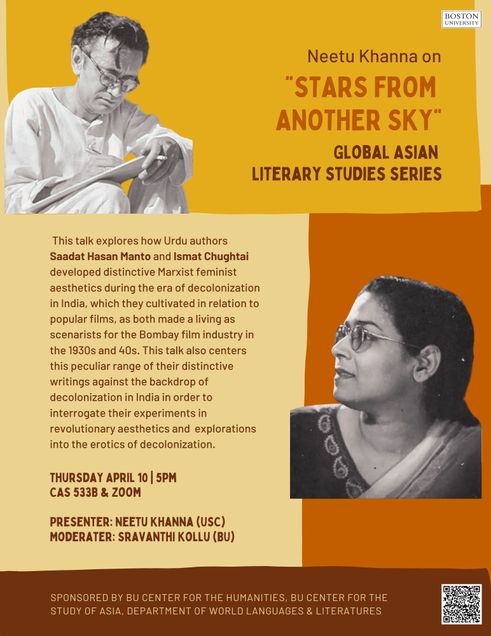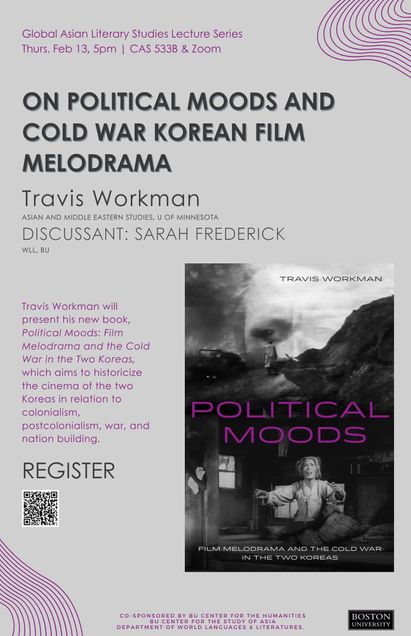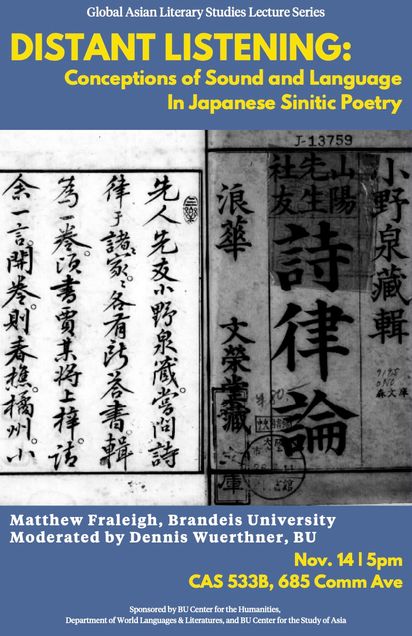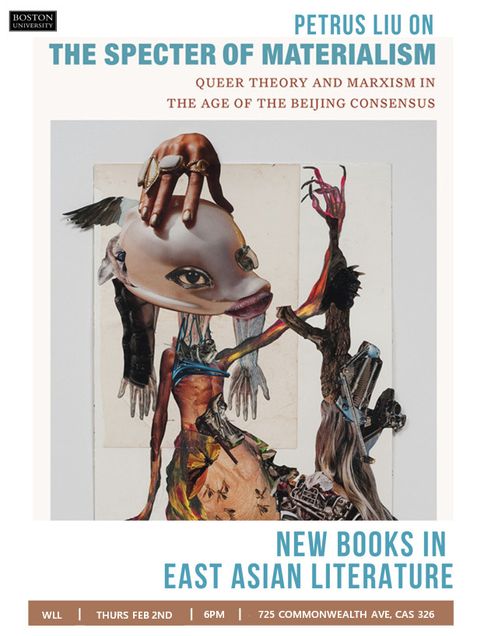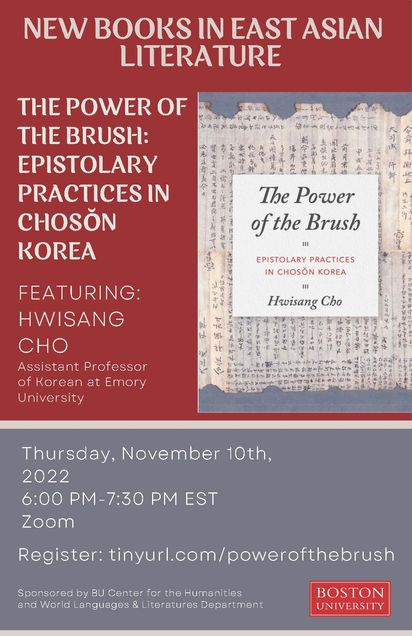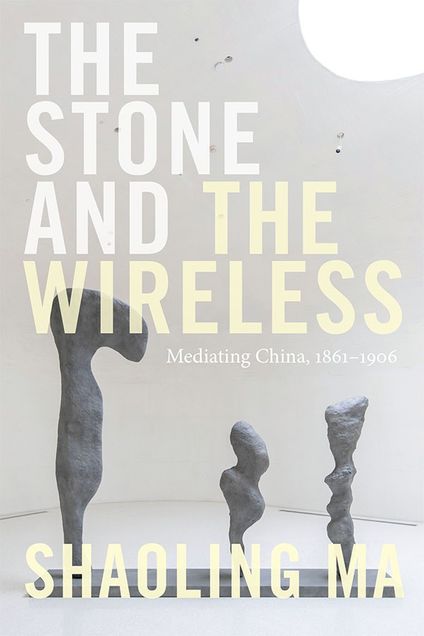BU World Languages & Literatures Lecture Series
Global Asian Literary Studies
If you have any questions, please contact the organizer of the lecture series, Yoon Sun Yang (yyoonsun@bu.edu), Associate Professor of Korean and Comparative Literature.
2025-2026
February 26: Territorializing Frontier through Literary Translation: Kim Tong-in’s “The Red Hill” and its East Asian Translations
Territorializing Frontier through Literary Translation: Kim Tong-in’s “The Red Hill” and its East Asian Translations
Miya Qiong Xie (Dartmouth College)
Through the theoretical lens of literary territorialization, Miya Xie reconceptualizes modern Manchuria as a critical site for making and unmaking national literatures in East Asia in her book Territorializing Manchuria: The Transnational Frontier and Modern Literatures of East Asia. In the book, she compares East Asian literatures in three different languages and analyzes their close connections in the transnational frontier. By revealing how writers of different nationalities constantly enlisted transnational elements within a nation-centered body of literature, Territorializing Manchuria uncovers a history of literary co-formation at the very site of division. In this talk, Xie will use the Korean writer Kim Tong-in’s (김동인, 1900–1951) short story “The Red Hill” (1932) and its East Asian translations to illustrate how regional translation of frontier literature is involved in the enterprise of literary territorialization.
Speaker Bio: Miya Qiong Xie is a scholar of Comparative Literature. Her research involves modern Chinese, Korean, and Japanese literature. Broadly, she is interested in how people from the margins – geographical or metaphorical – gain power, find identity, and establish connections through transcontextual negotiation and co-formation. Her first book, Territorializing Manchuria: The Transnational Frontier and Literatures of East Asia (Harvard Asia Center, 2013), received the MLA First Book Award and the First Book Award from Columbia University’s Weatherhead East Asian Institute. Built on her first book project, she continued to publish on Sinophone literature and Chinese ethnic minority literature. She is currently working on a new book project about literature, sexual violence, and trauma in contemporary East Asia.
Moderator/ Discussant: Catherine Yeh (Boston University)
Date: Thursday, February 26, 2026, 5 pm-6:30 pm (Eastern Time)
Place: CAS 533B & via Zoom
*To attend this event online, register in advance here: https://bostonu.zoom.us/meeting/register/8Zez6sElQ8i5IM8YkIdS6g

October 30: Getting Along with Imaginary Others
Christopher Weinberger
Getting Along with Imaginary Others: Case Studies in Japanese Fiction
Can novels contribute to the ethical lives of readers? What responsibilities might they bear in representing others? Are we ethically accountable for how we read fiction? Modern Japanese novels and contemporary metafiction, neither of which have figured centrally in Anglophone scholarship on novel ethics, offer innovative answers to these and other questions.
In this talk I will offer new readings of seminal works of Japanese literature to demonstrate how their metafictional strategies can provide new perspectives on contemporary concerns, including debates about identification and empathy, the representation of alterity, and widespread disagreement about whether novel ethics consists in the manner of reading, the effects of reading, or the content of novel representation. We will briefly trace the development of an overlooked “ethical reflexivity” in the fiction of modern writers often critiqued for ethical failures: Mori Ōgai (1868-1922) and Akutagawa Ryūnosuke. The talk will then focus on the relevance of their work for the contemporary moment through analysis of a writer whose ethics continue to provoke debate: Murakami Haruki (1949–). In the end we find a startling continuity between the methods of Japan’s novel progenitors and some of the supposedly recent innovations of metamodernism as well as an original methodology for the further study of world literature.
Speaker Bio: Professor Weinberger teaches Comparative and World Literature at San Francisco State University. He has published in Novel: A Forum on Fiction, Narrative, Representations, and positions: east asia cultures critique on the ethics of novel narration. His book on ethics and narrative reflexivity, Imaginary Worlds and Real Ethics in Japanese Fiction, calls attention to the ethical value of formal experimentation in metafictional writing and establishes a new model for cross-cultural studies of novel ethics. More recently, he has published on global realisms, metafiction, and narrative ethics in handbooks for Oxford University Press and Brill, and he is currently creating an interdisciplinary Video Game Studies program at SFSU.
Moderator: J. Keith Vincent (Boston University)
Date: Thursday, October 30th, 2025, 4:30 PM
Place: CAS 533B and on Zoom
View the recording here.
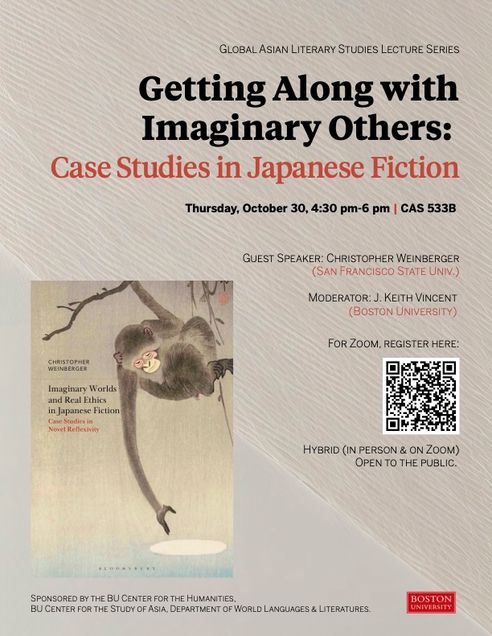
2024-2025
April 10: Stars from Another Sky
Dr. Neetu Khanna
Stars from Another Sky
This talk explores how Urdu authors Saadat Hasan Manto and Ismat Chughtai developed distinctive Marxist feminist aesthetics during the era of decolonization in India, which they cultivated in relation to popular films, as both made a living as scenarists for the Bombay film industry in the 1930s and 40s. Chughtai and Manto were a notorious and controversial pair, they wrote through and against each other, and were both tried for obscenity by the colonial government for their explicit representation of sexuality and sexual violence. While Manto and Chughtai are deemed some of the greatest practitioners of the Urdu short story form, and their writings remain some of the most searing and poignant explorations of the trauma of colonialism and Partition in India, Manto and Chughtai also wrote exposés about the scandals and sex-capades of the Bombay film celebrity world in 1940s India. I take the title of this talk from Saadat Hasan Manto’s Stars from Another Sky: The Bombay Film World of the 1940s, a promiscuous text that is part film journalism, part anti-colonial political critique, part autobiography, and part smutty film gossip. This talk centers this peculiar range of Manto and Chughtai’s distinctive writings against the backdrop of decolonization in India in order to interrogate their experiments in revolutionary aesthetics and their explorations into the erotics of decolonization.
Speaker Bio: Neetu Khanna’s areas of interest include theories and literatures of decolonization, global marxisms, postcolonial literature and theory, materialist aesthetics, and queer and feminist theory. Her recent book, The Visceral Logics of Decolonization (Duke University Press, 2020) rethinks the global project of decolonization by exploring a set of relations between embodied experience and political feeling that she conceptualizes as the visceral, centering on an archive of Muslim internationalist art and literature emerging between the 1930s and 1950s in India.
Moderator/Discussant: Dr Sravanthi Kollu (Postdoctoral Associate, Kilachand Honors College, Boston University)
Date: Thursday, April 10, 2025, 5:00 pm
Place: CAS 533B and on Zoom
Click here to view a recording of Dr. Khanna’s talk.
February 13: On Political Moods and Cold War Korean Film Melodrama
Travis Workman
On Political Moods and Cold War Korean Film Melodrama
Travis Workman will present his new book, Political Moods: Film Melodrama and the Cold War in the Two Koreas, which aims to historicize the cinema of the two Koreas in relation to colonialism, postcolonialism, war, and nation building.
Speaker Bio: Travis Workman is a professor of Asian and Middle Eastern Studies at the University of Minnesota.
Moderator/ Discussant: Sarah Frederick (WLL, Boston University)
Date: Thursday, February 13, 2025, 5:00-6:30 pm
Place: CAS 533B and on Zoom
Click here to view a recording of Workman’s talk.
November 14: Distant Listening: Conceptions of Sound and Language in Japanese Sinitic Poetry
Matthew Fraleigh
Distant Listening: Conceptions of Sound and Language in Japanese Sinitic Poetry
Sound is fundamental to most definitions of poetry, a mode of expression often distinguished by the combined emphasis it places upon both sound and sense. But what about poetry written in a language by those who do not speak it? Like their counterparts elsewhere in the Sinographosphere (which includes not only China, but Korea, Japan, and Vietnam), composers of Sinitic poetry in early modern Japan were keenly attentive to prosodic rules, tonality, rhyme, and other features conventionally associated with aurality. Yet such aspects of a poem were usually inaudible in the dominant form of oral performance practiced in Japan at the time: interpretive recitation aloud by kundoku. This talk examines the diverse ways in which early modern Japanese theorists and practitioners of Sinitic poetry grappled with this central issue. It draws predominantly on a range of eighteenth and nineteenth century writings in the “shiwa” 詩話 genre of “talks on poetry,” including treatises specifically addressing the aural features of Sinitic poetry. The paper also looks at how another type of shiwa, lexicons explicating obscure Sinitic poetic vocabulary, also shed light on conceptions of sound more obliquely. What do these writings tell us about how early modern Japanese poets conceived of the linguistic status of Sinitic texts?
Speaker Bio: Matthew Fraleigh is Associate Professor of East Asian Literature and Culture at Brandeis University. His research concerns the literature of early modern and modern Japan, especially kanshibun (Sinitic poetry and prose).
Moderator/Discussant: Dennis Wuerthner (WLL, Boston University)
Date: November 14, 2024, 5:00 pm
Place: CAS 533B
Click here to view a recording of Fraleigh’s talk.
2023-2024
April 18: Literature and Thought in Transwar Japan
Brian Hurley
Literature and Thought in Transwar Japan
How do we read an idea when it appears in the literary form of a novel, poem, or translation, rather than in the expository form of philosophy per se? My 2022 book Confluence and Conflict: Reading Transwar Japanese Literature and Thought thinks through this question by tracing the connections between the realms of literature and thought in 20th century Japan that have more often been held apart by the disciplinary divisions of our academy today.
The book puts the sensuous realm of literature into dialogue with the cerebral realm of thought in contexts ranging from the middlebrow novelist Tanizaki Jun’cihirō’s modern translation of The Tale of Genji (Genji monogatari) and the avant-garde modernist Yokomitsu Riichi’s legendary novel of ideas The Melancholy of Travel (Ryoshū) to the poet Nakano Shigeharu’s Marxist interpretation of everyday language and the culture of postwar liberalism that surrounded the scholar Edwin McClellan as he translated Natsume Sōseki’s classic novel Kokoro in 1950s America. Through these studies, the book constructs a framework for connecting prewar and postwar history by reading Japan’s turn to nationalism and fascism during the interwar years in transwar conversation with the reconstruction of liberal sentiments in the postwar period that followed.
As this book talk outlines the structure and content of Confluence and Conflict, it will also point to how writing the book planted the seeds that have grown into more recent projects related to literature and thought in other contexts. These projects include studies of the literary dimension of the conservative mind, the aesthetic critique of Cold War capitalism, and the transpacific life of Edgar Rice Burroughs’ iconic literary hero Tarzan during World War II.
Speaker Bio: Brian Hurley is Assistant Professor in the Department of Asian Studies at the University of Texas at Austin. His book Confluence and Conflict: Reading Transwar Japanese Literature and Thought (Harvard University Asia Center, 2022) received honorable mention in the Aldo and Jeanne Scaglione Book Prize for East Asian Studies presented by the Modern Language Association. It was also named a finalist in the Modern Japan History Association’s Book Prize competition. His most recent scholarship appears in articles to be published in 2024 in Comparative Literature Studies, The Journal of Asian Studies, Japanese Language and Literature, and positions: Asia critique.
Moderator/Discussant: J. Keith Vincent (WLL, Boston University)
Date: Thursday, April 18, 2024, 5:00 pm
Place: CAS 228
March 7: Tonal Intelligence: The Aesthetics of Asian Inscrutability During the Long Cold War
Sunny Xiang
Tonal Intelligence: The Aesthetics of Asian Inscrutability During the Long Cold War
“War” and “archive” are both necropolitical regimes prone to bleeding. What happens when they bleed into each other? Using the conceit of “warchives,” my talk asks: how have the temporalities, scales, and intensities of ongoing and incessant warfare reshaped the sensory habits and evidentiary norms through which we study it? That is, how have the militarization of daily life and the normalization of military violence changed what it means to perceive, archive, and analyze this bleeding thing called war? Part of my talk draws from my monograph, Tonal Intelligence: The Aesthetics of Asian Inscrutability During the Long Cold War (Columbia UP, 2020). Here, the portmanteau warchives allows me to delineate an archive of US cold war military intelligence and to model a method of analysis attuned to tone. This part of the talk reads Korean American poet Don Mee Choi’s 2016 mixed media book Hardly War alongside the CIA’s in-house journal Studies in Intelligence. I then shift to our current moment of living, writing, and teaching war. Here, too, warchives perhaps give us something to work with, a feeling if not a theory. Can the bleed and rhyme, the stutter and scat, the repetition and coincidence, the lack of space and breath, animated by warchives help us begin to describe my, your, our militarized present? I offer some thoughts and questions based on the inadequacies I’ve come up against this semester while teaching a course called “War and Everyday Life.”
Speaker Bio: Sunny Xiang is a professor of English and Ethnicity, Race, & Migration at Yale University. Her research and teaching focus on US military empire in Asia and the Pacific Islands.
Moderator/Discussant: Takeo Rivera (English, Boston University)
Date: Thursday, March 7, 2024, 5:30-7 pm
Place: CAS B20
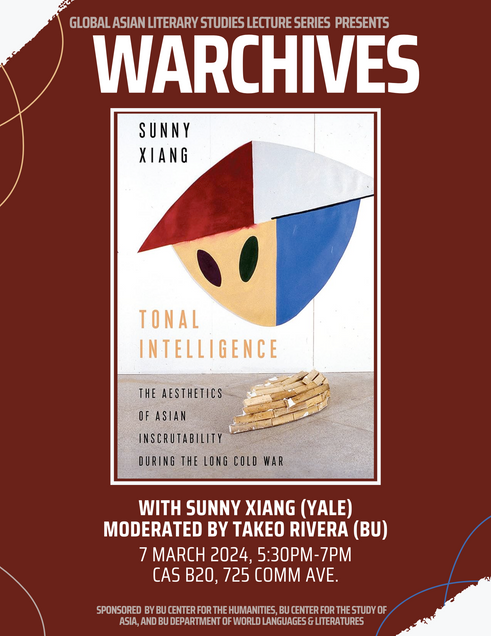
October 12: Reenacting, Remixing, and Speaking Back to the K-Wave from Below
Brian Bernard
Reenacting, Remixing, and Speaking Back to the K-Wave from Below: Northbound Media Tourism in Thai Destination Cinema
Time: Thursday, October 12, 2023
6pm
This event will take place in person.
Location: CAS B18
Against the backdrop of scholarship on popular Southeast Asian receptions of (and reactions to) the Korean Wave, this talk considers the transmedial and intertextual contexts of a Thai “destination cinema” that satirizes, critiques, and remediates the desires created by the reception, translation, and domestication of many aspects of the K-Wave.

2022-2023
April 27: A Very Short Introduction to Japanese Literature
Alan Tansman
A Very Short Introduction to Japanese Literature
Oxford University Press, 2023.
Time: Thursday, April 27, 2023
5:30 pm to 7:00 pm
This event will take place in person.
Location STH 636
With a history stretching back nearly 1,500 years, written works originating from Japan encompass a vast range of forms and genres. Since the eighth century, poetry and the non-philosophical lyric voice have occupied a central position in Japanese cultural life. The art of narrative would soon follow, blossoming in the eleventh century with one of the world’s great literary masterpieces, Murasaki Shikibu’s The Tale of Genji. Japanese literature later developed other genres no less important than poetry and narrative, among them the diary, the free-flowing essay, drama, the picture book, and the literary treatise.
While intensely attentive to its own tradition, Japanese literature has also embraced the outside world, particularly the influence of China. It is also embraced by the outside world in turn, exporting bestselling authors such as Haruki Murakami and Yukio Mishima. Beyond this, Japan boasts a powerful literary culture, made up of cultivated reading publics, both aristocratic and bourgeois, literary salons, specialized presses, authoritative judges of talent who cultivated and celebrated particular writers and styles, and a canon consisting of classics. A succinct introduction to one of the most dynamic and diverse world literatures, this Very Short Introduction traces the rich history of Japanese literature from its beginnings over a millennium ago to the present day.
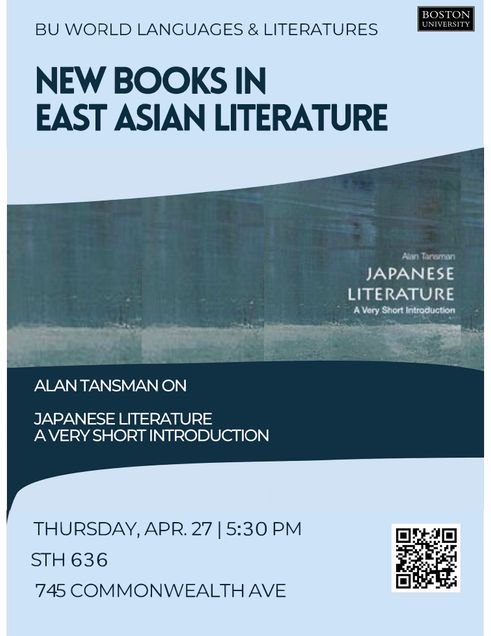
February 2: The Specter of Materialism: Queer Theory and Marxism in the Age of the Beijing Consensus
Professor Petrus Liu
The Specter of Materialism: Queer Theory and Marxism in the Age of the Beijing Consensus
Duke UP, 2023.
Time: Thursday, February 2, 2023
6:00pm to 7:30 pm
This event will take place in person.
Location CAS 326
In recent years, queer theory appears to have made a materialist turn away from questions of representation and performativity to those of dispossession, precarity, and the differential distribution of life chances. Despite this shift, queer theory finds itself constantly reabsorbed into the liberal project of diversity management. This theoretical and political weakness, Petrus Liu argues, stems from an incomplete understanding of capitalism’s contemporary transformations, of which China has been at the center. In The Specter of Materialism Liu challenges key premises of classic queer theory and Marxism, turning to an analysis of the Beijing Consensus—global capitalism’s latest mutation—to develop a new theory of the political economy of sexuality. Liu explores how relations of gender and sexuality get reconfigured to meet the needs of capital in new regimes of accumulation and dispossession, demonstrating that evolving US-Asian economic relations shape the emergence of new queer identities and academic theories. In so doing, he offers a new history of collective struggles that provides a transnational framework for understanding the nexus between queerness and material life.
Speaker Bio:
Petrus Liu is Associate Professor of Chinese & Comparative Literature and of Women’s, Gender, and Sexuality Studies at Boston University. His research interests lie at the intersection of queer theory and Marxist cultural criticism, which he explores through publications and courses on modern Chinese and comparative literature, digital media, capitalism and the novel, and new social movements in the global South.
Prof. Liu is the author of two previous scholarly monographs: Stateless Subjects: Chinese Martial Arts Literature and Postcolonial History (Cornell East Asia Series, 2011); Queer Marxism in Two Chinas (Duke University Press, 2015), winner of the Alan Bray Memorial Book Prize Honorable Mention and a studies category finalist for the 2016 Lambda Literary Award. Prof. Liu is also the coeditor (with Lisa Rofel) and cotranslator of Platinum Bible of the Public Toilet, a collection of short stories by the queer Chinese writer and filmmaker Cui Zi’en (Duke University Press, forthcoming).
The event is co-sponsored by the BU Center for the Humanities and the BU Department of World Languages & Literatures.
November 10: The Power of the Brush: Epistolary Culture in Choson Korea
New Books in East Asian Literature Lecture Series
Professor Hwisang Cho
The Power of the Brush: Epistolary Culture in Choson Korea
University of Washington Press, 2020.
Time: Thursday, November 10, 2022
6:00pm to 7:30 pm
Please click here to access the entire book. Please read the introduction and any further chapters that interest you as time allows.
The event will take place via Zoom. Register here.
Register in advance for this meeting:
https://bostonu.zoom.us/meeting/register/tJwlceisqz0iGNeCr_VajvHO_aqp9rzcxs7-
After registering, you will receive a confirmation email containing information about joining the meeting.
Focusing on the ways written culture interacts with philosophical, social, and political changes, The Power of the Brush examines the social effects of an “epistolary revolution” in sixteenth-century Korea and adds a Korean perspective to the evolving international discourse on the materiality of texts. It demonstrates how innovative uses of letters and the appropriation of letter-writing practices empowered cultural, social, and political minority groups: Confucians who did not have access to the advanced scholarship of China; women using vernacular Korean script, who were excluded from the male-dominated literary culture, which used Chinese script; and provincial literati, who were marginalized from court politics. The physical peculiarities of new letter forms such as spiral letters, the cooptation of letters for purposes other than communication, and the rise of diverse political epistolary genres combined to form a revolution in letter writing that challenged traditional values and institutions. New modes of reading and writing that were developed in letter writing precipitated changes in scholarly methodology, social interactions, and political mobilization. Even today, remnants of these traditional epistolary practices endure in media and political culture, reverberating in new communications technologies.
Speaker Bio:
Hwisang Cho specializes in cultural, intellectual, and literary history of Korea, comparative textual media, and global written culture. He earned his B.A. in Chinese literature from Korea University and his Ph.D. in Korean history from Columbia University. At Emory, Cho teaches courses on history of Korea (both modern and premodern), early modern East Asia, and epistolary culture.
The event is co-sponsored by the BU Center for the Humanities and the BU Department of World Languages & Literatures.
2021-2022
April 21: The Values in Numbers: Reading Japanese Literature in a Global Information Age
New Books in East Asian Literature Lecture Series
The Values in Numbers: Reading Japanese Literature in a Global Information Age
Professor Hoyt Long (University of Chicago)
Time: Thursday April 21, 2022, from 6 pm to 7:30 pm
Room: CAS 222 (In-person only)
The recent proliferation of digital archives and data-mining tools has renewed longstanding tensions between numbers and literary study. Where some call for a rapprochement, others insist on their fundamental incompatibility. What can the study of literature, Japanese or otherwise, gain from a more deliberate engagement with numbers and computation? This talk takes up the question from past, present, and future perspectives. I historicize the enduring tension of numbers and literary study within shifting conditions of knowledge production, hinting at what we might learn from earlier attempts by Japanese critics to read literature quantitatively. Next, a case study on the representation of race and ethnicity under Japanese empire helps demonstrate the possibilities for reading offered by today’s newest computational methods, like machine learning. Finally, I speculate on the possible futures of computation within Japanese literary studies, both as a catalyst for new disciplinary formations and as a means to develop critical literacy of the technologies set to define our coming information age.
Short Bio: Hoyt Long is Associate Professor of Japanese Literature at the University of Chicago. He teaches in the East Asian Languages and Civilizations Department and also co-directs the Textual Optics Lab. He has published extensively in the fields of modern Japanese literature, media history, and digital humanities. His current research interests include machine translation, computational approaches to world literature, and cultural production in the age of social media platforms.
**the 2021-22 theme of the lecture series is New Directions in East Asian Literary Studies.
The event is co-sponsored by the BU Center for the Humanities, BU Center for the Study of Asia, and BU Department of World Languages & Literatures.
March 18: China in Loops: Signals from 1900 and 2018. 8 pm
Shaoling Ma
Assistant Professor of Humanities (Literature) at Yale-NUS College
This lecture will be held virtually over Zoom. Please register for the event here:
https://bostonu.zoom.us/meeting/register/tJwscuGgpzorHNU_9HSgM4FFC0ykW3fUo8f0
Abstract: The project of knowing China finds itself in varying loops. Around the turn of the twentieth century, new communicative technologies’ contention with existing print media provided both the material infrastructure and the discursive content for science and technology to encroach upon notions of tradition and culture that had typically defined the late Qing. Well into the twenty-first century, the People’s Republic of China’s increasingly automated governance embody the cybernetic principles of recursivity and self-organization when computational processes both control and help proliferate new and indeterminate forms of social texts worldwide. My talk gives an overview of my recently published book, The Stone and the Wireless: Mediating China, 1896-1906, and focuses on telegraphy’s mediation of a global, oscillating Chineseness around the time of the Boxer Rebellion of 1900. I then discuss my second book project in progress, provisionally titled Outsmarting: A Little Red Manual, which examines the role of the uncomputable in contemporary PRC’s smart designs. By tracking an arc between the first binary signaling system and planetary-scale remote-sensing technologies, my effort to understand “China” in loops can hopefully open up new directions for Asian Studies more generally.
Speaker:
Shaoling Ma is an Assistant Professor of Humanities (Literature) at Yale-NUS College. Her research interests include literary and critical theory, media studies, and global Chinese literature, film, and art. She has published in peer-reviewed journals such as Configurations, Mediations, and positions.
Click here to watch a recording of the lecture, “The Stone and the Wireless” from March 18th. (BU Log-in required)
February 17. Minor Transpacific: Triangulating American, Japanese, and Korean Fictions. 6:30 - 8:00 pm
David S. Roh
Associate Professor of English and Director of the Digital Matters Lab
The University of Utah
This event will be held virtually over Zoom. Please register here:
https://bostonu.zoom.us/meeting/register/tJcocumrqTksE9JwU33Wdxk9JINNwqpXMPe-
There is a tendency to think of Korean American literature—and Asian American literature writ large—as a field of study involving only two spaces, the United States and Korea, with the same being true in Asian studies of Korean Japanese (Zainichi) literature involving only Japan and Korea. This book posits that both fields have to account for three spaces: Korean American literature has to grapple with the legacy of Japanese imperialism in the United States, and Zainichi literature must account for American interventions in Japan. Comparing Korean American authors such as Younghill Kang, Chang-rae Lee, Ronyoung Kim, and Min Jin Lee with Zainichi authors such as Kaneshiro Kazuki, Yi Yang-ji, and Kim Masumi, Minor Transpacific uncovers their hidden dialogue and imperial concordances, revealing the trajectory and impact of both bodies of work.
Minor Transpacific (Stanford UP, 2021) bridges the fields of Asian studies and Asian American studies to unveil new connections between Zainichi and Korean American literatures. Working in Japanese and English, David S. Roh builds a theoretical framework for articulating those moments of contact between minority literatures in a third national space and proposes a new way of conceptualizing Asian American literature.
Click here to watch a recording of the lecture, “Minor Transpacific: Triangulating American, Japanese, and Korean Fictions” from February 17th. (BU Log-in required)
2020-2021
November 17. Orthodox Passions: Rewriting the History of Emotions in Late-Imperial China. 4:00-5:30pm
Orthodox Passions: Rewriting the History of Emotions in Late-Imperial China
Maram Epstein (University of Oregon)
Tuesday, November 17, from 4 pm to 5:30 pm (EST)
The basic goal of Orthodox Passions: Narrating Filial Love during the High Qing (Harvard University East Asian Series, 2019) is to decenter romantic love as the normative translation of qing 情 in histories of Chinese emotion. By drawing on a wide range of sources that go beyond the usual cult of qing canon, I seek to challenge the May Fourth paradigm that continues to frame filial piety as a repressive ritual obligation that undergirded the despotic system of government and social order in imperial China. May Fourth attempts to produce an enlightenment modernity created the useful fiction of a monolithic feudal tradition that needed to be discarded, and filial piety was just one of the many traditional values that was declared to have no place in the modern. This view has been so dominant that for most of the twentieth and twenty-first centuries late-imperial formations of filial piety have received little critical attention. Orthodox Passions reframes the current understanding of filial piety by arguing that it should be understood not as an externally imposed set of ritual practices but as a deeply interiorized emotion that functioned similarly to love in the European west in articulating a self with affective and ethical agency.
In addition to giving an overview of the book and its interdisciplinary methodology, I will discuss its implications for analyzing the embrace of the modern concept of “love” 愛 in China’s early 20th century.
Sponsors: BU Center for the Humanities, Department of World Languages & Literatures, and BU Center for the Study of Asia

Click here to watch a recording of the lecture, “Orthodox Passions: Rewriting the History of Emotions in Late-Imperial China” from November 17th. (BU Log-in required)
February 10. Queer Chinese Cultures and Mobilities: Kinship, Migration, and Middle Classes. 4:00-5:30pm.
Queer Chinese Cultures and Mobilities: Kinship, Migration, and Middle Classes
John Wei (the University of Otago, New Zealand)
Wednesday, February 10, from 4 pm to 5:30 pm (EST)
March 5. Flowering Tales: Women Exorcising History in Heian Japan. 5:30-7:00pm
Flowering Tales: Women Exorcising History in Heian Japan
Takeshi Watanabe (Wesleyan University)
Friday, March 5, from 5:30 pm to 7 pm (EST)
https://bostonu.zoom.us/meeting/register/tJwqf-GgrDkqH9RPSWTiuhv64tkNmCetVpcJ
Click here to watch a recording of the lecture, “Flowering Tales: Women Exorcising History in Heian Japan” from March 5th. (BU log-in required)
April 14. Kinship Novels of Early Modern Korea: Between the Genealogical Time and the Domestic Everyday.
Ksenia Chizhova
Assistant Professor of Korean Literature and Cultural Studies
Department of East Asian Studies
Princeton University
https://bostonu.zoom.us/meeting/register/tJAvduisrTgvG9NQkt2MjD3nXUhP5f3aruW4
Violence and bloody family feuds constitute the core of the so-called lineage novels (kamun sosŏl) that circulated in Chosŏn Korea from the late seventeenth to the early twentieth century. Such subject matter becomes ever more puzzling when we consider that the main audience for these texts were elite women of Korea, who were subjected to exacting comportment standards and domestic discipline. Coeval with the rise and fall of Korean patrilineal kinship, these texts depict the genealogical subject—emotional self socialized through the structures of prescriptive kinship, but kinship itself is treated as a series of conflicts between genders and generations.
This talk will contextualize lineage novels and the domestic world in which they were read within the patrilineal transformation of the Chosŏn society and the emergence of elite vernacular Korean culture, patronaged by elite women. The proliferation of kinship narratives in the Chosŏn period illuminates the changing affective contours of familial bonds and how the domestic space functioned as a site of their everyday experience. Drawing on an archive of women-centered elite vernacular texts, this talk uncovers the structures of feelings and conceptions of selfhood beneath official genealogies and legal statutes, revealing that kinship is as much a textual as a social practice.
Bio: Ksenia Chizhova is an Assistant Professor of Korean Literature and Cultural Studies at Princeton University. Her main research interests include history of emotions, family, and writing in Korea, between the late seventeenth and twentieth centuries. Her most recent research project grows out of her continued fascination with vernacular Korean calligraphy and traces the shifts in contexts and infrastructure of graphic media that shaped the visual aesthetics of the Korean script, from the 17th century calligraphic practice to the contemporary fonts and graphic design in the two Koreas.
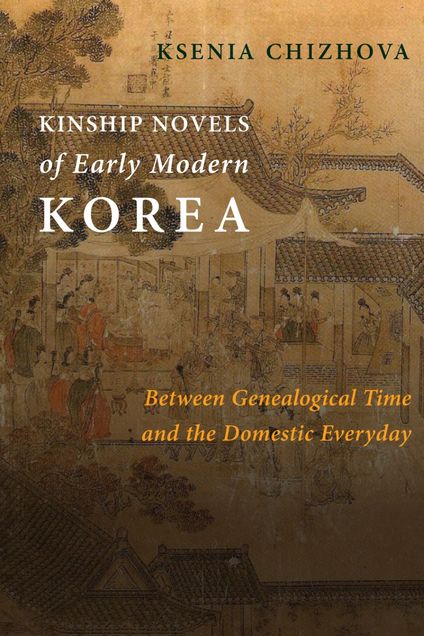
Click here to watch a recording of “Kinship Novels of Early Modern Korea: Between the Genealogical Time and the Domestic Everyday” (BU Log-in required)
